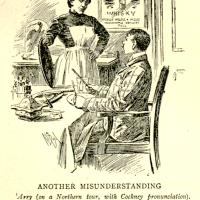

I was in a room on campus this week with English literature scholars from different disciplines. One of them tried to find words for C.S. Lewis‘ relationship with “politics.” “Lewis wasn’t political…” he began, and then added after a pause, “in that sense.” My colleague did not need to define what “that sense” was. Lewis was always making social commentary and had his own values and perspectives. Still, any self-critical reader today will have trouble making Lewis lay comfortably alongside any single political platform. It would be a challenge even for Procrustes, with his cunning engineering mind, to fit the sheets for any partisan bed prepared for Lewis.
Not that people don’t try. I have heard that an advocacy group has provided arguments for their men’s movement with Lewis’ essay, The Abolition of Man–about how we can lose our humanity unless we think critically about education and technology. Now, I find The Abolition of Man to be a challenging text. Still, can any reader not know that Lewis is talking about the social species Man–humankind, homo sapiens, children of Adam and Eve, you get the idea–and not whatever masculine, muscular, rugged vision of maleness they are inviting local men to envision.
It’s not that I mind men moving. I am one–a man, that is–and I move from time to time. What I struggle with is the eradicated space between that activist’s keyboard and Lewis’ lectern, as if Lewis’ ideas came from the printed book or computer screen. It’s the literary version of the school child who answers the question “Where does milk come from?” with the obvious answer, “The Store!” As readers, we can sometimes forget the space-time dislocation–though Lewis never ceased challenging readers to recognize that other-when and other-where authors used words differently and had different worldviews. We must learn to appreciate those minds to understand the text. Still, I have trouble believing that any philanthropic cause would twist the text’s meaning to their purposes–or that, if it is ignorant leadership, such a movement would move very far. Certainly, I am misinformed.

Still, it happens in less obvious ways. There is some cringe-worthy commentary on Lewis and the creation-evolution debate that twists him into unrecognizable works of geometric lawn art. Usually, though, social appropriators chop Lewis up into little bits. This annoyed him. Thus, when Kathryn Lindskoog shared her criticism of his work with Lewis, he commended her for realizing:
“… the connection, or even the unity, of all the books–scholarly, fantastic, theological–and make me appear a single author not a man who impersonates half a dozen authors, which is what I seem to most” (Oct 29, 1957 letter to Kathryn Stillwell).
One of the reasons it was refreshing to have this local literary conversation was because Lewis was treated as an integrated whole. They never even thought, it seems, to treat Lewis the Apologist in isolation from Lewis the Fantasist or Literary Historian. Even more importantly, Lewis’ theology, morality, cultural criticism, artistic expresses, and habits of the mind were all treated together with his literature.
Since then, I have been thinking about the consistent, artistic critique Lewis makes of culture–including that social-political commentary that is hard to streamline in party terms. Lewis crumbles the foundation of what “everyone” knows–whether common sense, academic trends, or political inner circle wisdom–and then redesigns the architecture of thought from the ground up. He does not always do it perfectly, but this two-step movement of intellectual renovation attracts me.

As this was on my mind, I started reading Lewis’s essay in Selected Literary Essays on Joseph Addison (1672-1719). an Enlightenment-era public intellectual. Addison co-founded The Spector magazine, a public-facing philosophical and literary daily that aimed “to enliven morality with wit, and to temper wit with morality” (see here). Rather than a vague “Lewis wasn’t political in that sense” approach, in this essay, Lewis brings the Whig-Tory battle of the 18th-century English political scene to the front of the discussion. Today’s left/right-liberal/conservative binary only helps a little in understanding the divide, depending on your view of the monarchy in British law. Addison was a Whig, and Lewis contrasted him to popular Tory writers Alexander Pope and Jonathan Swift (the other Swift, not Taylor).
Lewis is primarily interested in the rhetoric that era writers used in public debates. Addison’s party won the social-political long game, Lewis argues, because while Tories are railing at their enemies–often hilariously or satirically–Addison is reshaping the public image of his enemies into amiable old men who are fading with ancient days into the past. The contrast of approaches is intriguing:
“A satiric portrait by Pope or Swift is like a thunderclap; the Addisonian method is more like the slow operations of ordinary nature, loosening stones, blunting outlines, modifying a whole landscape with ‘silent overgrowings’ so that the change can never quite be reversed again. Whatever his intentions, his reasonableness and amiability (both cheerful ‘habits’ of the mind) are stronger in the end than the Tory spleen. To rail is the sad privilege of the loser” (“Addison,” Selected Literary Essays).

“To rail is the sad privilege of the loser.” A punchy line for today’s cage-match social discourse no less than 18th-century Tory-Whiggery or Lewis’ WWII England when the essay was written.
Still, we must admit that as writers, Swift and Pope have outlasted Addison–at least in the popular reach of modern classics. What kind of legacy do we want: literary or social?
Lewis would say that is a historical accident, in this case, for vehement opprobrium reveals subterranean desperation:
“When authors rail too much (we may allow them to rail a little) against public taste, do they perhaps betray some insufficiency?” (“Prudery and Philology,” Present Concerns)
Lewis occasionally railed too much–such as in a Curmudgeonly Christmas essay when he was under tremendous personal pressure. A careful reading of The Last Battle, for example, shows that when characters descend to verbal insults, unfettered vitriol, ill-drawn caricatures, tribal protectionism, or noisy reproach, they are characters who either have limited vision or are actively trying to blind others. Literature that betrays the “accent of the angry belle-lettrist railing” (“Addison,” Selected Literary Essays) is not a good look for the thinking writer.
Thus, I am going to take Lewis’ comment on “railing” at others as a prophetic critique. I won’t be silent to social injustice, theological insipidity, or dishonest scholarship. However, increasingly, I want to live in the Internet of Awesome rather than the Digital Dungeons of Christian Twitter, TikTok battles, or YouTube polemic. I will not spot every troll lurking in the Instagram comments, but at least I can try.
And, who knows? I, too, may have misjudged the shape of Lewis’ waiting bed in the spare room.






















Re “Lewis is talking about the social species Man–humankind, homo sapiens, children of Adam and Eve”
At the core of homo sapiens is unwisdom (ie, madness) and so the human label of “wise” (ie, sapiens) is a complete collective self-delusion — study the free scholarly essay “The 2 Married Pink Elephants In The Historical Room” … http://www.CovidTruthBeKnown.com (or https://www.rolf-hefti.com/covid-19-coronavirus.html)
“When a well-packaged web of lies has been sold gradually to the masses over generations, the truth will seem utterly preposterous and its speaker, a raving lunatic.” — Dresden James
Once you understand that humans are “invisibly” insane (pink elephant people, see cited essay) you’ll UNDERSTAND (well, perhaps) why they, especially their alleged experts, perpetually come up with myths and lies about everything … including about themselves (their nature, their intelligence, their origins, their “supreme” status, etc).
“All experts serve the state and the media and only in that way do they achieve their status. Every expert follows his master, for all former possibilities for independence have been gradually reduced to nil by present society’s mode of organization. The most useful expert, of course, is the one who can lie. With their different motives, those who need experts are falsifiers and fools. Whenever individuals lose the capacity to see things for themselves, the expert is there to offer an absolute reassurance.” —Guy Debord
Isn’t it about time for anyone to wake up to the ULTIMATE DEPTH of the human rabbit hole — rather than remain blissfully willfully ignorant in a narcissistic fantasy land and play victim like a little child?
The official narrative is… “trust official science” and “trust the authorities” but as with these and all other “official narratives” they want you to trust and believe …
“We’ll know our Disinformation Program is complete when everything the American public [and global public] believes is false.” —William Casey, a former CIA director=a leading psychopathic criminal of the genocidal US regime
“Separate what you know from what you THINK you know.” — Unknown
I appreciate your feedback.
Perhaps tangentially, but perhaps cogently, too, I recall the little item in The Pilgrim’s Guide: C.S. Lewis and the Art of Witness, ed. David Mills (Eerdmans, 1998) noting Walter Hooper’s identifying “The Source of C.S. Lewis’s Use of the Phrase ‘Mere Christianity'” as in Richard Baxter’s Church-history of the Government of Bishops (1680) in a passage which includes “I am against all Sects and dividing Parties […] I am of the Party which is so against Parties”. But Chesterton’s observation in chapter 17 of his Short History of England (1917) also comes to mind: ” The facade and outward form of this new secret government is the mere mechanical application of what is called the Party System. The Party System does not consist, as some suppose, of two parties, but of one. If there were two real parties, there could be no system.”
Intriguing. I have been trying to find a way to argue that Lewis does not use older texts in a linear way, but there’s always a jumble of things coming together in every idea he draws from the past or from literature. So bringing Baxter and Chesterton together would make sense. I’m inclined to wonder though, weather Chesterton is completely correct there. When I think of the American system, I begin to wonder.
Now, Lewis’s St. Athanasius Introduction for Sister Penelope’s translation, reprinted separately as “On the Reading of Old Books”, springs to mind: “Every age […] is specially good at seeing certain truths and specially liable to make certain mistakes.” How much might that be applicable to ‘western democracies’ of Chesterton’s day, and ours, as to unconscious/insufficiently-‘examined’ suppositions widely, and deliberate applications more specifically, or again to ‘science and scholarship’? (Not excluding ‘scientific materialism’ and its Frankfurtian heirs – and Rousseauian ancestors? – Lewis’s quotation about “l’esprit social” in his Sandhurst Preface, reprinted as “On the Transmission of Christianity”, also springs to mind.)
But I should also have said at once: thank you! – you’ve got me wanting to read that “Addison” essay! – how could I have neglected it, if neglect it I did, but how not have a vivid sense of its interest, so well conveyed here, if I did read it before? Only one way to find out… and see how it may fit in with the sense I am trying to form of Inklings’ 18th-century-English interests…
Major premise: to rail is the sad privilege of the loser. Minor premise: history is written by the winners. Conclusion: Histories should not contain raillery.
I’m going to have to ponder the implications of this.
Brilliant. I have 11 responses. Too much.